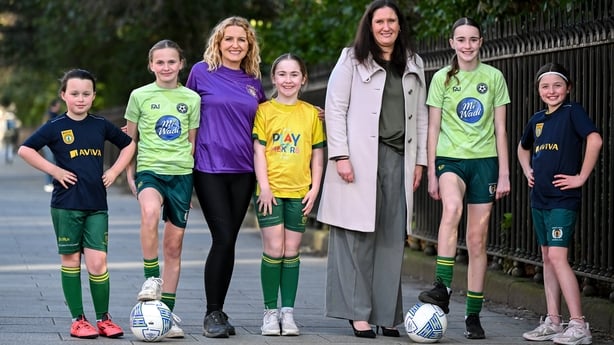The FAI have said Eileen Gleeson's role within the association has yet to be defined four months after they opted against renewing her contract as Republic of Ireland head coach.
Gleeson had a clause in her contract that ensures she has the option of staying in employment with the association in some capacity. However it's still unclear what that entails.
On the day that current head of women's and girls' football Hannah Dingley unveiled her two-year women and girls' football action plan, an FAI spokesperson said Gleeson's position hasn't been "defined".
When asked if Gleeson - the previous head of women's and girls' football - was working within her department, Dingley replied: "That's an ongoing situation that I don't know anything about.
"I worked really closely with Eileen when she was in post. She was a great support to me when I came into the role, really, really good.
"And we also have a women's strategic committee, we had a draft development plan which informed some of the thinking and the women's strategic committee had people from across the game, the league, grassroots, schools football and a lot of that feeds into coming up with the action plan."
This was Dingley's first formal media appearance since she took up the position last May. She said increasing female-friendly facilities at grassroots clubs must be the top priority if rising participation levels are to be properly harnessed.
The ratio of boys to girls playing football has reduced from 6:1 to 3:1 in the last six years, with over 45,000 women and girls registered to play competitive football in Ireland.
However, just 33% of amateur clubs have female-friendly changing facilities.
"That needs to be our No 1 agenda," stressed Dingley. "It needs more than just me or just the FAI. We need a collective push in my opinion, in all sports, to make sure we give equal opportunities for when girls play sport by providing female changing facilities.
"So yes, drive it, push it everywhere we can. That's what we've been saying internally to say to government, to councils, to anyone who’ll listen because it’s so important for a number of reasons; for women and girls, but also for safeguarding.
"If you think about young people and adults in the same spaces with no toilets, you think about girls who are on their period and don’t have sanitary bins. It’s such an important part. We really want to be pushing that. It will keep more girls in the game and it will encourage more girls to play our sport."
"We need to be able to provide more than that if we really truly want to get girls and boys active."
Asked if she'd received direct feedback from clubs that inadequate facilities are leading to a drop-off in numbers, Dingley replied: "Yeah 100%. Particularly here, we talk about Dublin, there’s a lot of council-run facilities and it’s just a grass pitch.
"We need to be able to provide more than that if we really truly want to get girls and boys active because it’s not necessarily a good environment, a safe space for them to be playing."
Dingley is aiming to increase participation in football among teenage girls in particular, and wants to see a woman on the football committee of every club in the country.
She also said that development squad games will be a part of international camps from now on in the absence of the home-based training sessions.

"We have the development squad in the last window and there will be some activity in the next window. And there is constant dialogue into how to develop that. Carla Ward has been excellent in terms of taking an interest in the League of Ireland.
"She has spoken to a lot of the League of Ireland managers, not all of them, watched training sessions and games. There will be opportunities for players in the League of Ireland going forward.
"We call it a development programme strategically yet because we don't want to come out and say it is not Under-21 or Under-23 yet. But it is a stepping stone in that direction and with the review of the pathway, that will inform what it turns into.
"If UEFA introduce a competitive Under-21, we want to be part of that and it’s how best we build towards that in terms of players who are home-based or in other countries."
Listen to the RTÉ Soccer podcast on Apple Podcasts, Spotify or wherever you get your podcasts.


